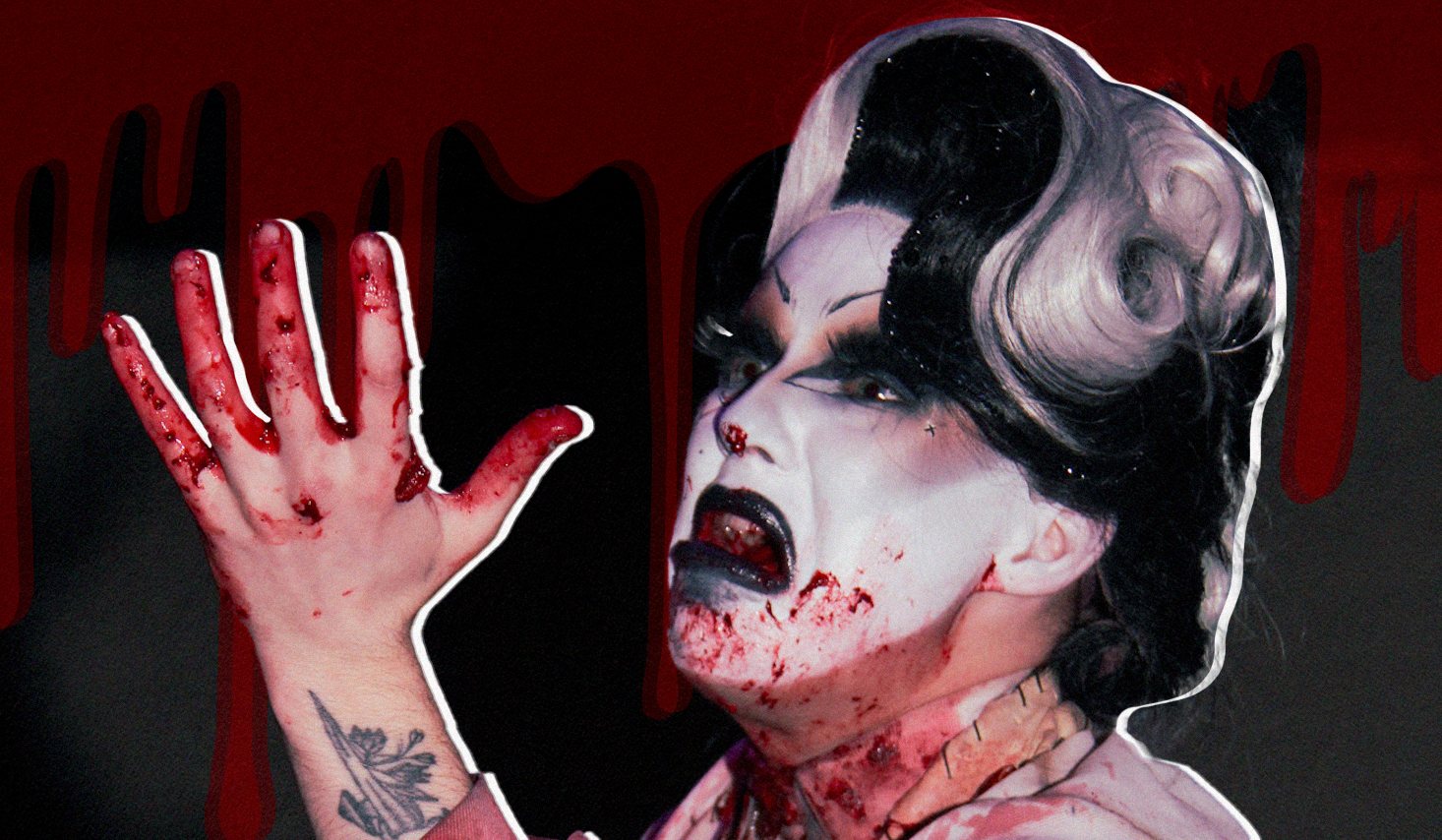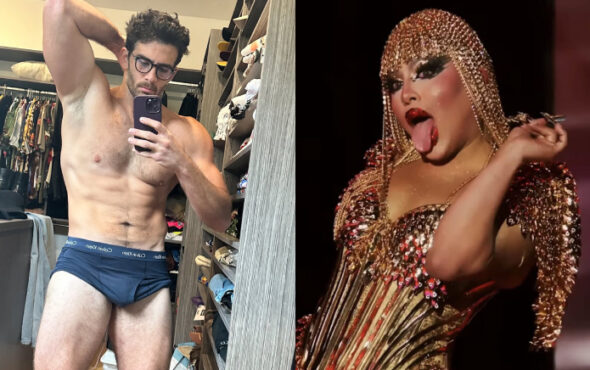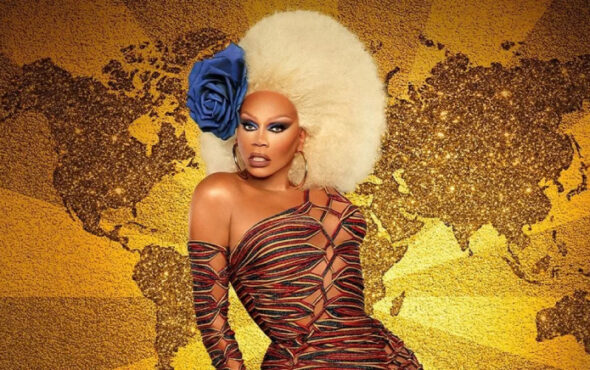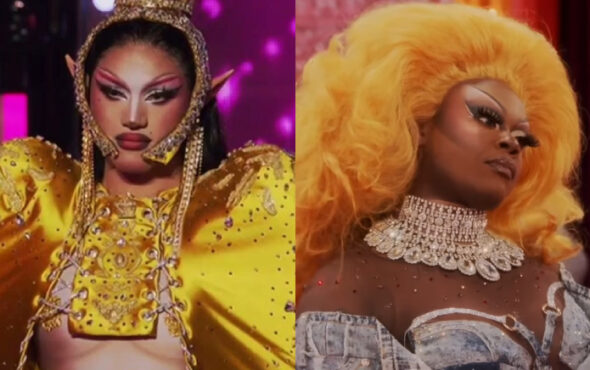
It’s a cold and drizzly night in Sheffield, but the cobbled courtyard of Forge Warehouse is packed full of goths in their most extravagant finery. They’ve braved the weather to witness the glow-up of Cryptid Queers, a beloved event which pairs the country’s most talented drag monsters with DJ sets full of dark, industrial bangers. It’s the first iteration of Cryptid Queers in the new, mammoth venue, a sign of the night’s rising popularity.
Presiding over the sexy, spooky and exhilarating chaos is Cryptid Queers’ founder, self-proclaimed “Prince of Thotness,” King Confuza. “Initially, I created this event as I was struggling to get bookings,” they tell GAY TIMES. “I wanted to create a platform not only for myself, but for other alternative artists in a similar position; events like this give them a chance to be their best, most weird and out-there selves on-stage.”
The line-up is stacked, the performances gloriously extra. “Punk, clown, drag entity” Draven issues a cathartic “fuck you” to the state, lip-syncing to a soundtrack of anti-authoritarian classics. Confuza takes to the stage as a rabid, blood-hungry wolf, a high-energy performance climaxing with the reveal of a giant inflatable lipstick strapped between their legs. Cadaverous Black performs a ghoulish number, screaming their lungs out against dry ice and wind machines. Inspired by Five Nights at Freddy’s, Manly Mannington emerges from a wooden box to torment and torture a security guard named Grizzly, delighting the crowd with their creepy yet quirky joint choreography.
Cryptid Queers is growing in scale and attendance, a fine-tuning of the formula Confuza has worked for years to perfect. It’s not just Sheffield, though; across the country’s northern cities, drag monsters are building their own platforms to showcase their skills.
View this post on Instagram
In 2022, Yvy DeLuca grew tired of seeing drag line-ups on Manchester’s Canal Street filled with cis, white performers, with the occasional person of colour booked as a “last-minute token.” Galvanised by this lack of representation, she created A-POC-ALYPSE CABARET, Manchester’s “POC Queer Coven Collective.”
Deluca is a wildly talented performer herself, known as the BollyWitch — a beautifully creepy persona, which fuses her experience as a practicing witch with her Indian heritage. Given her existing connections across the city’s thriving alt-drag scene, it didn’t take long for her to book diverse line-ups of drag things, kings and creatures, the kind of performers that “go against drag norms,” DeLuca says. Better still, she brought them — finally — into the heart of Canal Street, a decision made to “send a strong message that the shows in Manchester have no excuse to not book more POC artists and celebrate what we do.” A-POC-ALYPSE CABARET has sold out every time.
It’s still too often the case that mainstream line-ups are dominated by slim, white and hyper-femme performers. Mannington – a “cosplaying, Afrofuturist drag king by day, drag monster by night” — tells GAY TIMES that it’s still rare to meet other Black women in the drag scene. So, she created House of Mannington, a platform intended to nurture the skills of other performers who don’t fit the mainstream mould. Mannington may be new to drag, but so far she’s wasted little time creating the Black Excellence cabaret, as well as fleshing out several characters inspired by nerd culture and her Caribbean roots. “Someone called my drag the Manly-verse,” he explains, “as it’s like having versions of Manly Mannington from different dimensions, all unique in their own way!”
With the exception of Mannington, who “blurs the lines between king and monster” and has a few less horror-themed acts in his back pocket, everyone I speak to confirms that drag monsters are still too often relegated to Halloween bookings. Even Mannington has been told that he’s too “sideshow” for some standard drag acts.
DeLuca has heard from mainstream bookers that they “aren’t aware” of Manchester’s drag monsters. “I see that as being lazy,” she says. “We’re not in hiding!” When spooky season does roll around, she sees a handful of drag monsters being booked for bigger gigs – “even then, [producers] at times ask monsters to tone it down, or police their art to please the audience.” Confuza believes that drag monsters are “the most overlooked of all the drag sub-genres, sometimes even more so than kings,” and says it’s been difficult to find nights that celebrate their drag all year round. “There are some wonderful alt promoters, but we’re often regarded as Halloween acts by the rest of the drag world.”
In Scotland too, there are weird and wonderful DIY and alt-drag nights offering something different to the primped and polished mainstream. “There are always weirder, more experimental things happening on the fringes,” says Glasgow-based “drag abomination” Puke, a persona they describe as “the forced exorcism of every putrid thought inside my head.” They speak with reverence of nights like Glasgow’s now-defunct Bonjour, which “truly championed marginalised performers, musicians and DJs,” but Puke says rising costs are making it harder for these nights to sustain themselves.
View this post on Instagram
Despite this adversity, queer creatives are finding ways to spotlight drag without having to fight for late-night licenses. Puke performs regularly at DIY cabarets like Spangled Cabaret and Queer Theory, where they’re often the only drag act amongst poets, musicians, comedians and burlesque performers. “These types of events are important for people who aren’t necessarily into clubbing until 3am, but who still seek the thrill of live queer art.” They’ve also taken gigs at Ushi’s Coffee Corner, a queer-run vegan café, and events run by Matchbox Cine, indie organisers known for screening bizarre, subversive films.
Clearly, there’s no shortage of talented drag kings, things and monsters in the UK. The performers I speak to give dozens of recommendations: in Manchester, there are stars like Eva Serration, Judas Darkholme, the Creeper Tikez, Glitter King and Misty Fye; in Glasgow, there’s Shrek 666; Vee Dagger makes regular appearances in Leeds, and Mannington credits Jada Love and Romeo de la Cruz with creating “amazing alternative drag and gorelesque” across the Midlands. Confuza adds names like Marvy Mucus, Xavier Switchblades, Harddeep Singh, Sodapop, Binjuice and Valkyrie Cain. “There are so many incredibly talented alt artists out there,” they say. “I’m such a huge fan of everyone I get to work with.”
The rise of Drag Race may have boosted the art-form’s global fanbase, but it’s also created new levels of income inequality in drag, and reified the notion of drag as a queen-centric practice. Yet the spectrum of this queer art-form has never been broader or more brilliantly bizarre — and as the latest iteration of Cryptid Queers has proven, there’s a huge appetite to see this gleefully ghoulish fuckery on a large scale. Across the North in particular, drag creatures, things and monsters are carving out their own platforms to terrify and delight their audiences in equal measure, fighting for a more inclusive industry along the way.


